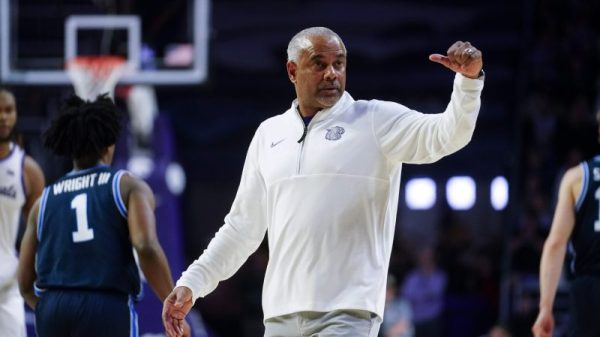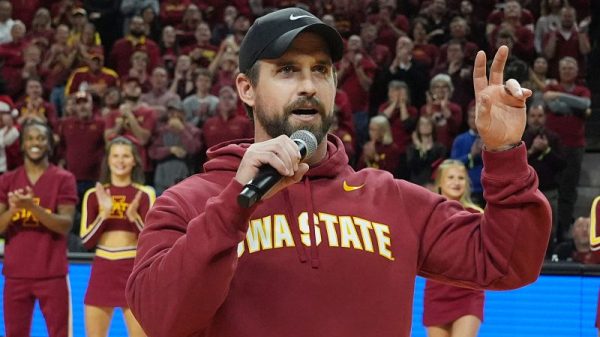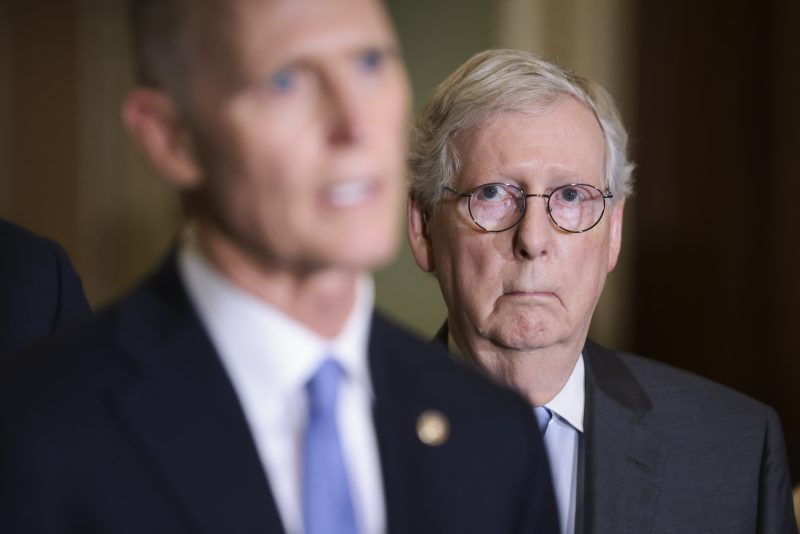Ever since President Biden delivered the moment Republicans perhaps feared in his State of the Union address Tuesday — seizing on Sen. Rick Scott’s (R-Fla.) plan to sunset all federal programs, which would include Social Security and Medicare — Scott and others have worked hard to cast it as a lie.
It wasn’t a lie, though, despite Rep. Marjorie Taylor Greene’s (R-Ga.) jeers. While you could fault Biden for casting a plan with no realistic prospects of passing as representative of the broader GOP’s aspirations, he did characterize it carefully. He even acknowledged that few Republicans have endorsed it.
And now Sen. Mitch McConnell (R-Ky.) has undercut Scott’s entire effort, delivering a rebuke that’s remarkable for a number of reasons.
On a local Kentucky radio show with host Terry Meiners on Thursday, McConnell was asked specifically about whether Republicans want to sunset Social Security and Medicare, and McConnell pinned that idea to Scott.
“Well unfortunately, that’s the Scott plan,” McConnell said. “That’s not a Republican plan; that was the Rick Scott plan.”
The interviewer then noted Scott said it wasn’t his plan and asked McConnell what the GOP’s alternative was. That seemingly gave McConnell an opening to move on from the subject.
But McConnell wasn’t letting it go. He said he and House Speaker Kevin McCarthy (R-Calif.) had pledged no entitlement cuts and added that they were “more authoritative” than “any single senator.”
Then came the headline-grabbing moment. Meiners asked McConnell whether there was still bad blood over Scott’s recent failed challenge to McConnell for GOP leader after the 2022 election.
“This doesn’t have anything to do with that,” McConnell said, before moving on to Scott’s 2024 reelection bid. “I mean it’s just a bad idea. I think it will be a challenge for him to deal with this in his own reelection in Florida, a state with more elderly people than any other state in America.”
To put that in context: McConnell, who has a very good shot at becoming majority leader again after the 2024 election and has built a reputation for a win-at-all-costs mentality, is spotlighting one of the biggest supposed liabilities of one of the GOP’s most important candidates.
(Scott’s campaign has not responded to a request for comment on McConnell’s remarks.)
McConnell could just as easily have echoed other members of his party by saying that Biden had lied, or at least that he had mischaracterized Republican goals; he could have talked around the issue by focusing on proposals that are actually viable. After all, it’s been clear for a long time that he was none too pleased with Scott’s agenda: When it debuted last year, McConnell said — in a more indirect rebuke — that Scott could address his own plan, adding, “We will not have as part of my agenda a bill that raises taxes on half the American people and sunsets Social Security and Medicare within five years.”
The implication was clearly that this was Scott’s brainchild, and that McConnell wanted nothing to do with it. But McConnell is now saying so directly. And now, one of the country’s most powerful Republicans has said that Scott’s plan would indeed result in the outcome Scott has strained to avoid admitting.
Scott has skirted the fact that his proposal calls for sunsetting all federal programs — necessarily including the entitlements — every five years and forcing their reauthorization. Instead, he has talked around the issue, including in a CNN interview Thursday, by emphasizing he isn’t calling for cuts. (A press release from Scott’s campaign on Wednesday referred eight times to Biden having purportedly lied.)
Pressed on this by Fox News host John Roberts in March, Scott said, “No one that I know of wants to sunset Medicare or Social Security” — but he did not say that the programs would be exempt from his proposal.
But, as noted above, McConnell didn’t have to say any of this. And despite his suggestion that this statement didn’t have anything to do with Scott challenging him, it’s abundantly clear there’s some pent-up frustration with what Scott has saddled the party with (and perhaps some frustration with the GOP’s disappointing 2022 results with Scott leading its campaign arm). Beyond that, it’s possible McConnell saw the need to send a message to Scott and to anyone who might emulate him.
Then there’s the question of the political wisdom of essentially fact-checking one of your own 2024 candidates.
Scott is a top Democratic target — but in large part because they don’t have many targets. Florida was once a swing state, but it’s trended red, with every statewide Republican winning by more than 16 points in 2022.
Scott himself is a proven winner, having won two campaigns for governor and one for Senate, in 2018. But each of those races was decided by about one percentage point or less, indicating that he is no shoo-in next year.
Republicans don’t necessarily need Scott to win to take the Senate majority and for McConnell to lead the chamber again; they have three red states to target and five more states Biden won by less than his national margin.
But you never know which race will determine the majority. Scott’s razor-thin 2018 win was very important to the GOP’s ability to gain seats and keep a 51-49 majority in what was otherwise a very good election for Democrats. Now McConnell is delivering a sound bite that could well be used against Scott in the next campaign.
Whether born of frustration, a need to create as much distance as possible between Scott’s plan and the broader GOP, or the desire to send a warning to anyone else considering trying to set an agenda for the party — or some combination of the three — it’s a tantalizing early storyline in the 2024 election, and the evolving McConnell-Scott relationship.



























